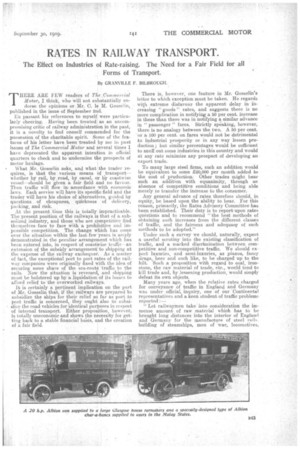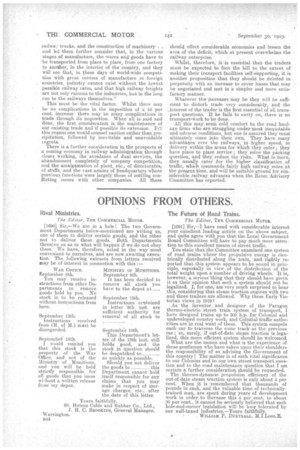RATES IN RAILWAY TRANSPORT.
Page 23

Page 24

If you've noticed an error in this article please click here to report it so we can fix it.
The Effect on Industries of Rate-raising. The Need for a Fair Field for all Forms of Transport.
By GRANVILLE F. BILBROUGH.
THERE ARE FEW readers of The .Commercial Motor, I think, who will not substantially endorse the opinions or Mr. C. le M. Gosselin, published in the issue of September 2nd.
En passant his references to myself were particularly cheering. Having been treated as an uncompromising critic of railway administration in the past, it is a novelty to find oneself commended for the possession of the charitable spirit. Some of the features of his letter have been treated by me in past issues of The Commercial Motor and several times I have deprecated the apparent intention in official quarters to check and to undermine the prospects of motor haulage.
What Mr. Gosselin asks, and what the trader requires, is that the various means of transport— whether by rail, by road, by canal, or by coastwise vessel—should be given a fair field and no favour. Then traffic will flow inaccordance...t.... i h w economic laws. Each service will have its specific field and the trader will have his choice of alternatives, guided by questions of cheapness, quickness of delivery, packing, and risk.
At the present time this is totally impracticable. The present position of the railways is that of a subsidized industry, and those who are competitive find themselves face to face With a prohibitive and impossible competition. • The change which has come over the situation within the last few years is amply demonstrated in the peculiar arrangement which has been entered into, in respect of coastwise traffic—an extension of the subsidy. arrangement to shipping at the expense of the railway exchequer. As a. matter of fact, the exceptional port to port rates of the railway companies were originally fixed with the idea of securing some share of the sea-route traffic to the rails. Now the situation is reversed, and shipping must be bolstered up by a liquidation Of its losses to afford relief to the overworked railways.
It is certainly a, pertinent implication on the part of Mr. Gosselin that, if the railways are prepared to subsidize the ships for their relief so far as port to port traffic is concerned, they ought also to subsidize the road vehicles for identical purposes in respect of internal transport. Either proposition, however, is totally uneconomic and shows the necessity for getting back to a stable financial basis, and the creation of a fair field. There is, however, one feature in Mr. Gosselin's letter to which exception must be taken. He regards with extreme disfavour the apparent delay in increasing " goods " rates, and suggests there is no more complication in notifying a 60 per cent, increase in these than there was in notifying a similar advance in " passenger " fares. Strictly speaking, however, there is no analogy between the two. A 50 per cent. or a 100 per cent. on fares would not be detrimental to industrial prosperity Or in any way lessen production; but similar percentages would be sufficient to snuff out some industries in this country and would at any rate minimize any prospect of developing an export trade.
To many large steel firms such an addition would be equivalent to some 220,000 per month added to the cost of production. Other trades might bear such an addition with equanimity, through an absence of Competitive conditions and being able merely to transfer the increase to the consumer.
Any general advance of rates therefore should, in equity, be based upon the ability to bear. For this reason, primarily, the Rates Advisory Committee has been established. Their duty is to report Upon rates questions and to recommend "the best methods of obtaining such increases from the different classes of traffic, and the fairness and adequaoy of Such methods to be adopted."
Under such a survey we should, naturally, expect a careful scrutiny into the existing classification of traffic, and a marked discrimination between competitive and non-competitive traffic. We should expect luxuries, and semi-luxuries, as pianos, fancy drugs, .beer and such like, to be charged up to the hilt. 'Such a proposition with regard to coal, ironstone, the raw material of trade, etc., would tend to kill trade and, by lessening production; would simply defeat its own objects.
Many years ago, when the relative rates charged for conveyance of traffic in England and Germany was under official inquiry, one of our 'Continental representatives and a keen student of traffic problems reported :— " Let railwaymen take into •consideration the immense amount of raw material which has to be brought long distances into the interior of England and Germany for the manufacture of steel; raik. building of steamships, men of war, locomotives, railwas, trucks, and the construction of machinery . . and let them further consider that, in the various stages of manufacture, the wares and goods have to be transported, from place to place, from one factory to another' in the interior of the country, and they will see that, in these days of world-wide competis tion with great centres of manufacture in foreign countries, industry cannot exist without the lowest possible railway rates, and that high railway freights are not only ruinous to the industries, but in the long run to the railways themselves."
This must be the vital factor. Whilst there may be no complications in the imposition of a 60 per cent. increase there may be Many complications in trade through its imposition. When all -is• said and done, the first consideration is the maintenance of our existing trade and if possible its extension. Fin.; this reason one would counsel caution rather than.precipitation, followed by inevitable and unavoidable
egrets.
There is a further consideration in.the prospects of a coming economy in railway administration through closer working, the avoidance of dual services, the abandonment completely a company competition, and the amalgamation of plant, etc.' of directorates, of staffs, and the vast armies of headquarters whose previous functions were largely those of settling conflicting issues with other companies. All these should effect considerable economies and lessen the arca of the deficit, which at present overwhelms the railway enterprise.
Whilst, therefore, it is essential that the traders must be expected to foot the bill to the extent of making their transport facilities self-supporting, it is another proposition that they should be debited in . perpetuity with an increase to cover losses that may be negotiated and met in a simpler and more satisfactory manner.
Whatever the increases may be they will be sufficient to disturb trade very considerably, and the interest of the trader is the first essential of all transport questions. If he fails to carry on, there is no transport4Vork to be done. All this may seem cold comfort to the road haulage firms who are struggling under most inequitable and adverse conditions, but one is assured they must ultimately come into their own. They have many advantages over the railways, in higher speed, in delivery within the areas for which they cater ; they have place to place service ; they solve the packing question, and they reduce the risks. What is More, they usually cater for the higher classification of traffic, whiiih commands fairly high railway rates at the present time, and will be suitable ground for considerable railway advances when the Rates Advisory Committee has reported.






























